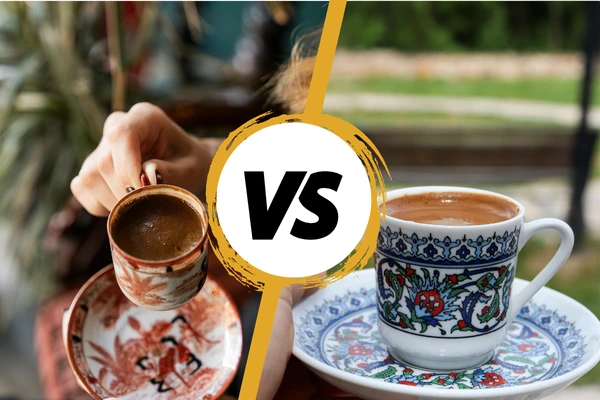Cyprus coffee vs Turkish coffee is a tricky comparison, because the truth is they are more alike than different. Both trace their roots to the same traditions of the Eastern Mediterranean, both rely on the same finely ground Arabica beans, and in most homes or cafes they are brewed in exactly the same way. What you end up with in the cup is essentially the same thick, foamy, unfiltered coffee that has been enjoyed for centuries. Let’s take a look at this comparison.
Cyprus Coffee vs Turkish Coffee – Are They the Same?
At their core, Cyprus coffee and Turkish coffee are identical. The traditions come from the same roots, and the method of preparation has remained virtually unchanged for generations. If you put the two side by side, you would struggle to tell them apart.
Here are the key similarities:
- Both use Arabica beans that are ground to a fine powder.
- Both start with cold water in the pot.
- The brewing process is the same, slowly heating the water and coffee until it almost reaches boiling point.
- Both create a thick layer of foam on top.
- Both are served in small cups meant for slow sipping.
- Both are left unfiltered, so the grounds settle at the bottom of the cup.
By every practical measure, these two coffees are the same brew. Whether you drink it in Nicosia or Istanbul, the taste and texture remain unchanged.
Origins of Turkish and Cyprus Coffee
The story of both Turkish and Cyprus coffee begins with the Ottoman Empire. Coffee was introduced to the empire in the 16th century and quickly became a central part of daily life.
Since the empire was ruled from what is now Turkey, many people naturally connect Turkish coffee with the origins of this entire tradition. In fact, when people talk about Bosnian coffee, Greek coffee, Egyptian coffee, or Cyprus coffee, they are usually referring to the same Ottoman-era method that spread throughout the empire’s vast territory.
Cyprus became part of the Ottoman Empire in the late 16th century, and with it came the culture of coffee. Just as in Istanbul or any other Ottoman city, Cypriots adopted the habit of preparing finely ground coffee in small copper pots, served in tiny cups with thick foam. Over time, this ritual became ingrained in Cypriot culture, just as it did in other regions once under Ottoman rule.
So when we talk about Turkish coffee and Cyprus coffee, we are really looking at two branches of the same family tree. The method, the flavor, and even the social importance all trace back to the same Ottoman roots, with the differences today being more about national identity than about the coffee itself.
You may find this good to know: What makes Turkish coffee truly different.
Key Takeaways
Cyprus coffee and Turkish coffee are essentially one and the same.
- Both trace their roots to the Ottoman Empire, with Turkey seen as the center of this tradition.
- Both use finely ground Arabica beans brewed slowly in cold water until just below boiling.
- Both create that signature thick foam on top.
- Both are served unfiltered in small cups meant for lingering over conversation.
- The differences come less from the cup itself and more from cultural identity and naming.

